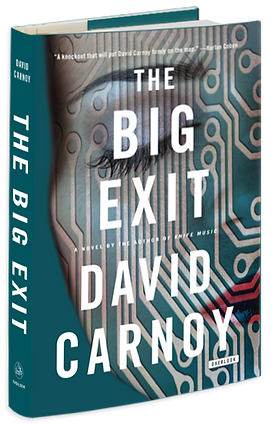


The Big Exit
October 11, 2012
Overlook Press
Hardcover, Digital and Audio formats
Available for Order
Excerpt from The Big Exit
0/ PROLOGUE
911 dispatcher: 911, state your emergency.
Hill: It’s my husband.
911 dispatcher: Yes, go ahead.
Hill: Please get someone here. (Incoherent).
911 dispatcher: Miss, I can’t hear you. Can you please speak into the phone?
Hill: My husband’s dead. Someone’s killed my husband.
911 dispatcher: Okay. Are you certain he’s dead?
Hill: He didn’t have a pulse. There’s blood everywhere. Oh my God.
911 dispatcher: Ma’am, can you please tell me your name?
Hill: Beth Hill.
911 dispatcher: Are you in your home?
Hill: No, I’m outside. Please get someone here quickly. [redacted] Robert S Drive. I’m afraid he’s still here.
911 dispatcher: Who’s still there?
Hill: Whoever did this. My God. I can’t breathe.
911 dispatcher: Ma’am, are you in a safe room? Are you in a room where the door can be locked?
Hill: No, I’m outside near the garage.
911 dispatcher: But the phone you’re on, it’s cordless?
Hill: It’s my cell phone. I’m going inside now.
911 dispatcher: Is there anybody else in the house?
Hill: No.
911 dispatcher: Do you have children?
Hill: No. (Sound of door opening). Okay, I’m in the den. I’m shutting the door.
911 dispatcher: Good. Okay. Someone will be right over. A police officer will be there shortly. And I’ll stay on the phone until he comes. My name is Susan. Can you tell me, where in the house did you find your husband?
Hill: He wasn’t in the house. He was in the garage.
911 dispatcher: And you said there was a lot of blood. Did someone shoot him?
Hill: I don’t know. I don’t think so. There was so much blood it was hard to tell. I didn’t think it was Mark. I kept saying, it’s not him. It couldn’t be. But I saw his watch. He wears a Rolex.
911 dispatcher: And you said you touched him?
Hill: I touched his wrist to feel his pulse.
911 dispatcher: And you couldn’t feel anything?
Hill: I knew it. As soon as I saw him. I knew he was dead.
911 dispatcher: Can you tell me how you found him?
Hill: I came home. I went to pull the car in the garage and there he was. I saw him in my headlights. He was on the floor of the garage.
911 dispatcher: His car was in the garage?
Hill: No, just outside. Well, the one car—the one he was driving—was outside the garage and the other was inside. He has two cars.
911 dispatcher: Was the garage door open?
Hill: Yes.
911 dispatcher: The lights are off, though? The car wasn’t running?
Hill: No, the car wasn’t running.
911 dispatcher: Beth, the police should be there any minute. So hang on, okay?
Hill: (Incoherent).
911 dispatcher: If you want to say anything, you just go right ahead.
Hill: I can’t believe this is happening.
911 dispatcher: Beth, can you tell me whether you saw anything unusual? Was there a car you didn’t know parked down the street?
Hill: No. I didn’t see anything.
911 dispatcher: And do you know when your husband came home? Did he tell you when he was coming home?
Hill: Not exactly. He BlackBerry’d me around four to say that he was leaving the office early today and that he wouldn’t be late. But I don’t know when he left.
911 dispatcher: And how long does it take him to get home?
Hill: Around twenty minutes, depending on the traffic.
911 dispatcher: So you think somewhere around—(Beeping noise). Is someone trying to call?
Hill: (pause) It’s my neighbor.
911 dispatcher: You see the number in caller ID?
Hill: Yes. They must have heard me screaming.
911 dispatcher: Do you want to put me on hold and speak with them?
Hill: No. Wait, I hear something.
911 dispatcher: Is someone in the house? (pause) Beth, do you hear someone in the house?
Hill: It’s outside. I think they’re here.
911 dispatcher: Is there a window in the room you’re in?
Hill: (pause) Yes, there’s a police car outside.
911 dispatcher: Okay, Beth. I’m going to stay on the phone until you let them in. They’re aware of the situation.
Hill: Thank you. Thank you for your help. I’m sorry. I’m so sorry you had to deal with this.
911 dispatcher: It’s all right. It’s quite all right.
END OF CALL